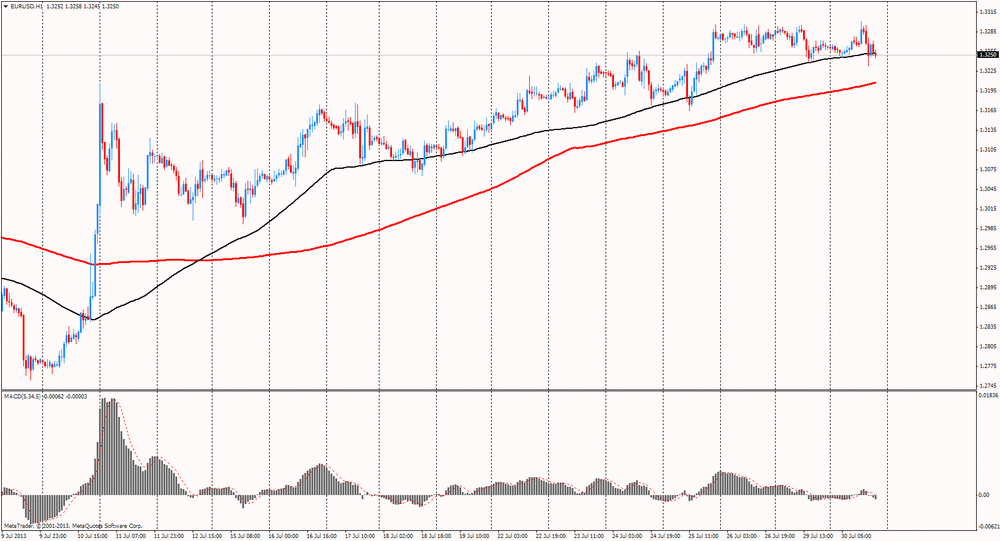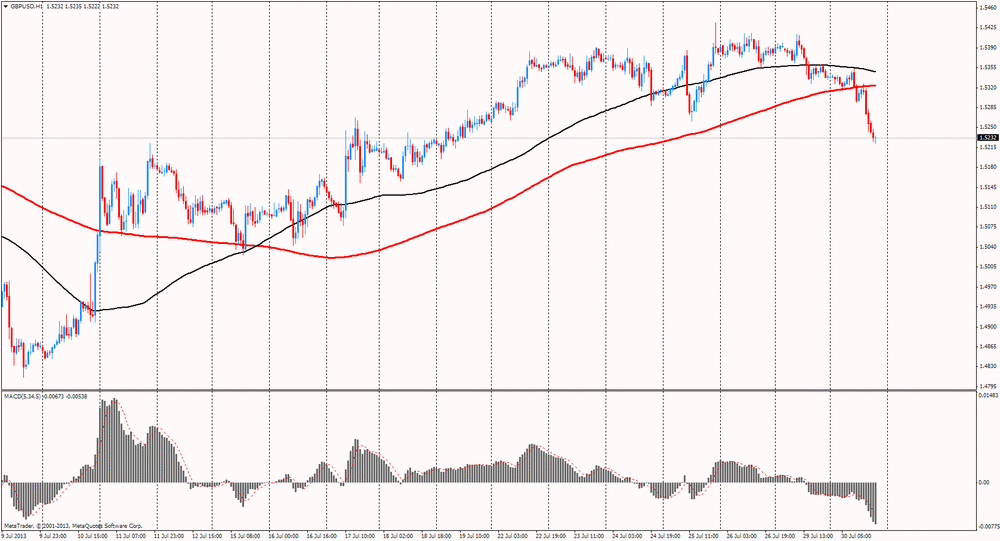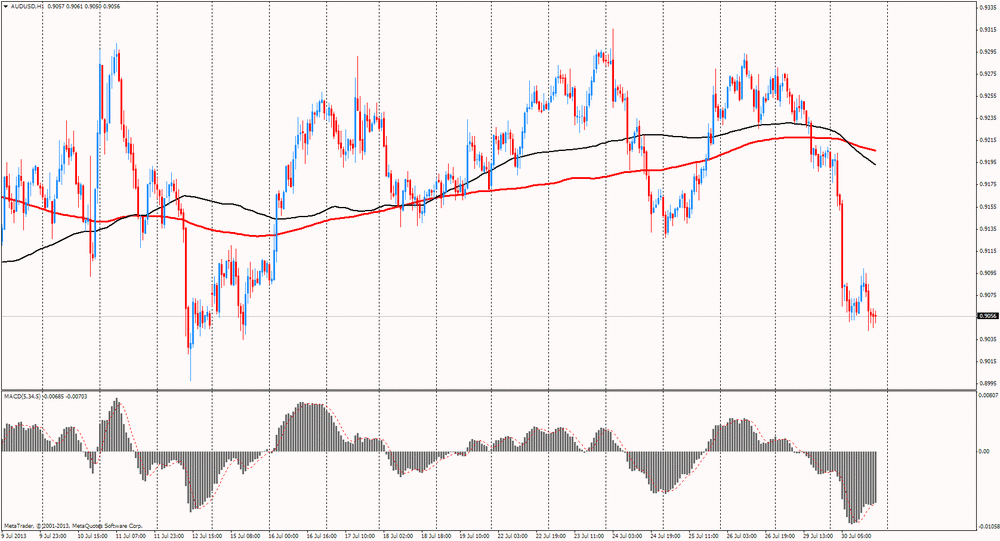Notícias do Mercado
-
20:00
Dow -10.1 15,511.87 -0.07% Nasdaq +15.04 3,614.18 +0.42% S&P +0.37 1,685.70 +0.02%
-
19:00
American focus: the U.S. currency rose against the euro
The dollar rose against the euro, helped by expectations of U.S. President Barack Obama. Experts believe that in his speech, Obama may affect the discussion of lower tax rates on the income of the company (American companies are currently paying 35%).
Add that to the dynamics of trade was also influenced by data from the S & P / Case-Shiller, which showed that home prices in 10 major U.S. cities rose by 11.8% in the year ended in May. The housing price index S & P Case-Shiller 20-city U.S. in May grew by 12.2% y / y compared with 12.5% growth predicted by economists.
Seasonally adjusted, the house price index S & P Case-Shiller 10 cities of the United States in May rose by 2.5 m / m, and the 20-city index rose 2.4% in May compared with April.
Prices in Dallas and Denver have exceeded their maximum values recorded before the financial crisis in June 2007 and August 2006, respectively. In addition, in five cities - Atlanta, Chicago, San Diego, San Francisco and Seattle - monthly growth rates for the first time exceeded 3%.
Housing prices have increased for more than a year. Low mortgage rates and strong job growth have raised demand, while the supply of homes is relatively low.
The pound was down against the U.S. dollar in anticipation of the Bank of England's MPC meeting, as investors prefer to close long positions. On Thursday at 11:00 GMT the Bank of England will announce its decision on monetary policy. It is expected that the QE program will be in the amount of 375 million pounds, while the key interest rate will probably be left at 0.5. However, we should not exclude the probability of surprises. So, published last week, a report showed the UK economy growing by 0.6% in the second quarter, as analysts. According to experts, it undercut speculation as to what the Bank of England near the end of the current monetary policy. In case of additional evidence supporting fears pound can resume growth.
The Australian dollar fell sharply after the Governor of the Reserve Bank of Australia Governor Glenn Stevens, like, opened the way to a new lower interest rate. During his speech, which was remembered hints of policy easing, Stevens said that restrained inflation means that the RBA may, if necessary to lower the benchmark interest rate, which is already at a record low of 2.75%.
This important comment was made just a week before the August RBA meeting and he plunged the Australian dollar in sharp decline.
"Recently, we say that, given the inflation outlook, it will be possible to resort to further ease monetary policy if needed to support the demand. Recent inflation data have not changed it," - said Stevens. The rate of inflation in Australia in the 2nd quarter was 2.4%, while in the depths of the target range 2% to 3%. As if to reinforce this point of view, Stevens said that although the series of rate cuts made by the end of 2011, effectively works by helping to stimulate the economy outside the mining industry, this does not mean that the central bank will lower rates again.
"Definitely, there are signs that in this respect, our policies are working, although at the moment is not so much that we have seen a serious obstacle to the further easing of policy, if it is appropriate from a macroeconomic point of view," - he said.
-
18:21
European stock indices rose
European stocks advanced as investors weighed corporate earnings from Electricite de France SA to Barclays Plc and the Federal Reserve began a two-day policy meeting.
The Stoxx Europe 600 Index added 0.2 percent to 299.55 at 4:35 p.m. in London. The gauge has rallied 5.1 percent in July, heading for the biggest gain since October 2011, as the Fed said it remains flexible on the pace of asset purchases. The U.S. central bank starts a two-day meeting today and the European Central Bank and the Bank of England announce policy decisions on Thursday.
National benchmark indexes advanced in 15 of the 18 western European markets today.
FTSE 100 6,570.95 +10.70 +0.16% CAC 40 3,986.61 +17.70 +0.45% DAX 8,271.02 +11.99 +0.15%
In the U.S., house prices increased by the most in more than seven years in May. The S&P/Case-Shiller index of property values climbed 12.2 percent from a year earlier after advancing 12.1 percent in April.
EDF soared 6.8 percent to 21.61 euros, the highest price since November 2011, as the company reported a 3.5 percent increase in first-half profit on cold weather. Earnings before interest, taxes, depreciation and amortization of 9.7 billion euros (12.9 billion) beat the 9.24 billion-euro median estimate of five analysts surveyed.
Alcatel-Lucent rallied 14 percent to 1.83 euros, the highest since March 2012, after reporting second-quarter sales and earnings that surpassed analysts’ estimates and saying Qualcomm Inc. agreed to buy a minority stake.
International Personal Finance Plc (IPF) jumped 15 percent to 652.50, the highest price since the company started trading on the London Stock Exchange in July 2007 after being split off from Provident Financial Plc. The home-credit business, which offers unsecured loans to low-income households in eastern Europe and Mexico, posted first-half pretax profit that beat estimates and announced a share buyback program.
Wacker Chemie AG jumped 9.6 percent to 76.08 euros, the highest price since February 2012. Europe’s largest polysilicon maker posted second-quarter earnings before interest, tax, depreciation and amortization of 188.2 million euros, surpassing the 171.4 million-euro average estimate.
ITV Plc surged 6.7 percent to 167.6 pence, the highest price since the owner of the U.K.’s biggest commercial TV station started trading in February 2004, after reporting first-half sales of 1.31 billion pounds ($2 billion). That beat the 1.15 billion-pound average analyst forecast.
-
17:00
European stock close: FTSE 100 6,570.95 +10.70 +0.16% CAC 40 3,986.61 +17.70 +0.45% DAX 8,271.02 +11.99 +0.15%
-
16:40
Oil: an overview of the market situation
Prices of oil futures declined substantially, falling to $ 103 per barrel, before the publication of the weekly oil inventory data from the API, and also after the weak report on consumer confidence in the United States.
It should be noted that a report from the Conference Board showed that consumer expectations about the short-term outlook weakened in July and the corresponding indicator of consumer confidence in July fell more than expected. Conference Board said its consumer confidence index fell to 80.3 in July from a revised 82.1 in June. Economists had expected the index to fall to 81.1 from 81.4, which was originally reported in the previous month. In addition, it was reported that the index of expectations in the U.S. in July fell to 84.7 against 91.1 in June, while the current conditions index for July rose to 73.6 against 68.7 in June.
Has had little impact as the report from S & P / Case-Shiller, which showed that home prices in 10 major U.S. cities rose by 11.8% in the year ended in May. The housing price index S & P Case-Shiller 20-city U.S. in May grew by 12.2% y / y compared with 12.5% growth predicted by economists.
Seasonally adjusted, the house price index S & P Case-Shiller 10 cities of the United States in May rose by 2.5 m / m, and the 20-city index rose 2.4% in May compared with April.
Prices in Dallas and Denver have exceeded their maximum values recorded before the financial crisis in June 2007 and August 2006, respectively. In addition, in five cities - Atlanta, Chicago, San Diego, San Francisco and Seattle - monthly growth rates for the first time exceeded 3%.
Meanwhile, add the pressure on oil prices has approximating the Fed meeting, the results of which are expected to be presented tips on reducing the volume of asset-purchase program. Many economists expect that the decline may begin as early as September this year.
The cost of the September futures on U.S. light crude oil WTI (Light Sweet Crude Oil) fell to 103.05 dollars a barrel on the New York Mercantile Exchange.
September futures price for North Sea Brent crude oil mixture fell to $ 106.88 a barrel on the London exchange ICE Futures Europe.
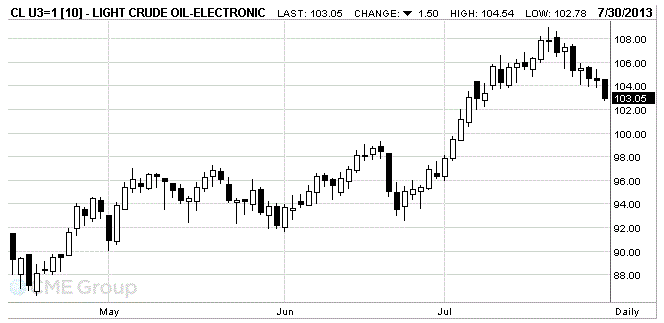
-
16:20
Gold: an overview of the market situation
Gold prices fell slightly today, as many traders prefer to stay out of the market ahead of U.S. Fed meeting, which may shed light on the rate at which the Fed will reduce rates of monetary stimulus. It should also be added that influenced the trading session could have the European Central Bank and the Bank of England, which is scheduled for this week and is expected to confirm previous recommendations.
Recall that last week, gold was back above the $ 1,300 that was the first time in a month, based on comments from Fed Chairman Ben Bernanke that a highly accommodative monetary policy will be needed for the foreseeable future, and that any reduction in the volume of purchases of bonds will be depend on the strength of the economy. The Fed previously said it would probably start reducing programs to stimulate the economy at the end of 2013, and stops all the way to the middle of 2014, which strengthened the dollar and made gold more expensive for foreign investors.
We also add the demand for gold jewelry in India, which is the major buyer of the precious metal, went into decline. According to experts, it is unlikely to gain momentum until the end of August, when activated by just buying season against the season of weddings and religious festivals.
In part on the dynamics of trade have influenced U.S. data. Conference Board released a report that showed that consumer expectations about the short-term outlook weakened in July and the corresponding indicator of consumer confidence in July fell more than expected. Conference Board said its consumer confidence index fell to 80.3 in July from a revised 82.1 in June. Economists had expected the index to fall to 81.1 from 81.4, which was originally reported in the previous month.
The cost of the August gold futures on COMEX today dropped to $ 1324.60 per ounce.
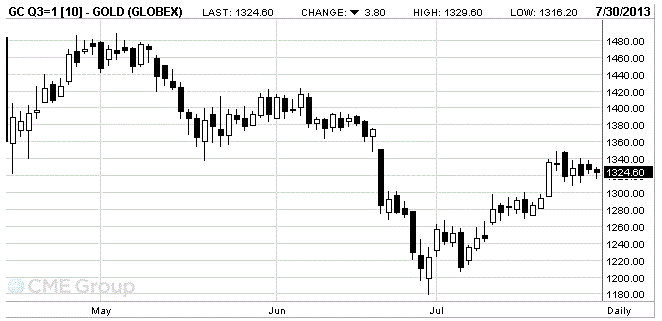
-
15:30
U.S. consumer confidence falls more than expected in July
With consumer expectations regarding the short-term outlook weakening in July, the Conference Board released a report on Tuesday showing that consumer confidence for the month fell by more than economists had anticipated.
The Conference Board said its consumer confidence index dropped to 80.3 in July from a revised 82.1 in June. Economists had been expecting the index to dip to 81.0 from the 81.4 originally reported for the previous month.
-
15:00
U.S.: Consumer confidence , July 80.3 (forecast 81.1)
-
14:45
Option expiries for today's 1400GMT cut
EUR/USD $1.3100, $1.3200, $1.3250, $1.3285, $1.3325
USD/JPY Y97.00, Y97.50, Y98.00, Y98.05, Y98.20, Y98.40, Y98.50, Y98.75, Y99.00, Y100.0
EUR/JPY Y130.00
GBP/USD $1.5200, $1.5300, $1.5325, $1.5335, $1.5350
EUR/GBP stg0.8630
AUD/USD $0.9150, $0.9215, $0.9265, $0.9330, $0.9350, $0.9375
USD/CAD C$1.0200, C$1.0270, C$1.0300
-
14:34
U.S. Stocks open: Dow 15,564.31 +42.34 +0.27%, Nasdaq 3,612.89 +13.75 +0.38%, S&P 1,690.53 +5.20 +0.31%
-
14:26
Before the bell: S&P futures +0.30%, Nasdaq futures +0.41%
U.S. stock-index futures rose as Eastman Chemical Co. (EMN) and Aetna Inc. raised their forecasts for full-year profit and investors awaited results from the Federal Reserve’s two-day policy meeting.
Global Stocks:
Nikkei 13,869.82 +208.69 +1.53%
Hang Seng 21,953.96 +103.81 +0.48%
Shanghai Composite 1,990.06 +13.76 +0.70%
FTSE 6,578.85 +18.60 +0.28%
CAC 3,985.88 +16.97 +0.43%
DAX 8,283.34 +24.31 +0.29%
Crude oil $103.46 -1.04%
Gold $1321.20 -0.54%
-
14:00
U.S.: S&P/Case-Shiller Home Price Indices, y/y, May +12.2% (forecast +12.5%)
-
13:46
German inflation unchanged in July
Germany's EU harmonized inflation stayed unchanged in July, contrary to economists' forecast for a slowdown, latest data showed Tuesday.
Inflation, as per the harmonized index of consumer prices (HICP), was 1.9 percent in July, unchanged from the June figure, the Federal Statistical Office said. Economists had forecast inflation to ease to 1.8 percent.
The HICP moved up 0.4 percent compared to June, when it logged a 0.1 percent gain. The index was forecast to grow 0.3 percent month-on-month.
At the same time, the consumer price index advanced 1.9 percent year-on-year in July, after growing 1.8 percent a month earlier. The annual growth was expected to ease to 1.7 percent.
Sequentially, the consumer price index increased 0.5 percent during the month, following the previous month's 0.1 percent gain. The forecast was for a weaker rise of 0.3 percent, data showed.
-
13:30
Canada: Raw Material Price Index, June +4.0% (forecast 0.0%)
-
13:30
Canada: Industrial Product Prices, m/m, June +0.3% (forecast +0.1%)
-
13:00
Germany: CPI, m/m, July +0.5% (forecast +0.3%)
-
13:00
Germany: CPI, y/y , July +1.9% (forecast +1.7%)
-
12:45
Orders
EUR/USD
Offers $1.3340/50, $1.3320/25, $1.3300, $1.3280
Bids $1.3230, $1.3200, $1.3180
GBP/USD
Offers $1.5415/20, $1.5380/90, $1.5355, $1.5320/25
Bids $1.5280, $1.5255/50, $1.5225/20, $1.5200
AUD/USD
Offers $0.9235/40, $0.9190/00, $0.9160/65, $0.9115/25, $0.9100
Bids $0.9000, $0.8990/80, $0.8950
EUR/JPY
Offers Y132.00, Y131.85/90, Y131.50, Y131.20, Y130.90/00, Y130.75/80
Bids Y130.00, Y129.50, Y129.20, Y129.00
USD/JPY
Offers Y99.50, Y99.00, Y98.65/70, Y98.45/50
Bids Y97.50, Y97.40/20, Y97.10/00, Y96.50
EUR/GBP
Offers stg0.8700, stg0.8680/85
Bids stg0.8620, stg0.8600, stg0.8575/65, stg0.8550
-
11:30
Most European stocks advanced
Most European stocks advanced as investors weighed corporate earnings results and the Federal Reserve began a two-day policy meeting. U.S. index futures were little changed while Asian shares gained.
Electricite de France SA, Europe’s biggest power generator, rose 7.7 percent to 21.79 euros, the highest price in 20 months, as the company reported a 3.5 percent increase in first-half profit on cold weather. Earnings before interest, taxes, depreciation and amortization of 9.7 billion euros (12.9 billion) beat the 9.24 billion-euro median estimate of analysts.
Alcatel-Lucent SA, a French maker of phone equipment, rallied 7.6 percent to 1.72 euros, the highest since April 2012, after reporting second-quarter sales and earnings that surpassed analysts’ estimates and saying Qualcomm Inc. agreed to buy a minority stake.
FTSE 100 6,569.88 +9.63 +0.15%
CAC 40 3,973.65 +4.74 +0.12%
DAX 8,262.29 +3.26 +0.04%
-
11:15
Australia building approvals contract unexpectedly in June
The number of dwelling units approved in Australia in June declined unexpectedly, the latest figures from the Australian Bureau of Statistics showed Tuesday.
Building approvals fell a seasonally adjusted 6.9 percent month-on-month in June compared with forecast of a 2 percent increase. The number of approvals declined 4.3 percent in May.
On an annual basis, building consents contracted 13 percent. The number of approvals totaled 12,778 during the month.
As many as 7,926 private sector houses were approved during the month. This was 1.2 percent less than a month earlier and represented the first monthly decline in six months. Year-on-year, number of private sector houses approved rose 9.9 percent.
Approvals for private sector dwellings, excluding houses, declined 12.6 percent month-on-month to 4,543. This was 37.4 percent lower than a year earlier.
-
11:00
Eurozone economic confidence improves in July
Eurozone economic confidence strengthened in July, driven by improved confidence among consumers and managers in industry, services and retail trade, survey data from the European Commission showed Tuesday.
The economic confidence index improved to 92.5 from 91.3 in the previous month. The reading matched economists' expectations.
Sentiment in the industrial sector rose to -10.6 from -11.2 in June. This was resulted from improvements in managers' production expectations and their assessment of the current level of overall order books.
Services confidence saw the sharpest increase of all sectors covered in July, driven by improved assessments of the past business situation and past demand. The index came in at -7.8 compared to -9.6 a month ago.
Consumer confidence improved markedly in July and for the eighth successive month. The indicator climbed to -17.4 from -18.8 last month.
A separate survey showed that business confidence improved for a third consecutive month in July. The reading rose to -0.58 from -0.67 in June.
The assessment of past production strengthened sharply and also production expectations and the level of overall order books were appraised more positively. At the same time, the assessment of the level of export order books and the stocks of finished products remained broadly unchanged.
-
10:45
German consumer optimism strongest since 2007, GfK survey shows
Sentiment among German consumers is set to rise to its highest level in almost six years heading into August, as households' propensity to buy improved along with an increase in their economic and income expectations at the start of summer, a survey report from market research firm GfK revealed Tuesday.
The forward-looking consumer confidence index posted 7 in August, up from 6.8 in July. A higher value was last recorded in September 2007, when the indicator was at 7.3. Economists had expected a more modest increase to 6.9.
"As summer finally arrived in Germany, it was not just the temperature but also the mood of consumers that was rising this month," GfK said in the survey report. The continued stability of employment prospects and a moderate rate of inflation caused optimism to rise once more in July, the report added.
The economic expectations of German consumers increased for the third consecutive month in July, with the corresponding indicator improving to 4.3 from 1.1 in June.
The level is only slightly above average and this suggested that the recovery of Germany's economy will be rather sluggish and is also likely to suffer some minor setbacks, GfK said. The firm pointed out that persisting recessions in a number of Eurozone countries and growth slowdown in China could adversely impact German economic situation.
The income expectations index rose for a fourth consecutive month in July and now stands at 42.8, which was 6.6 points above the June reading. A higher value was last recorded in June 2011, when the indicator posted 44.6. The indicator reflecting consumers' willingness to buy increased to an 18-month high of 40.7 in July from 36.5 in June. The consumer climate index edged up to 6.8 from 6.5 in June.
Private consumption is therefore confirming its important role as a reliable pillar for the German economy, GfK said. A favorable consumption situation helped the economy to escape recession in the first quarter of 2013.
The Bundesbank said in a report earlier this month that it sees stronger signs of a slowdown in growth in the third quarter after a solid expansion in the second quarter. The economy expanded 0.1 percent in the first quarter recovering from a contraction in the final quarter of 2012.
-
10:26
Option expiries for today's 1400GMT cut
EUR/USD $1.3100, $1.3200, $1.3250, $1.3285, $1.3325
USD/JPY Y97.00, Y97.50, Y98.00, Y98.05, Y98.20, Y98.40, Y98.50, Y98.75, Y99.00, Y100.0
EUR/JPY Y130.00
GBP/USD $1.5200, $1.5300, $1.5325, $1.5350
EUR/GBP stg0.8630
AUD/USD $0.9150, $0.9215, $0.9265, $0.9330, $0.9350, $0.9375
USD/CAD C$1.0200, C$1.0270, C$1.0300
-
10:01
Eurozone: Business climate indicator , July -0.53 (forecast -0.54)
-
10:00
Eurozone: Economic sentiment index , July 92.5 (forecast 92.5)
-
10:00
Eurozone: Industrial confidence, July -10.6 (forecast -10.2)
-
09:40
Asia Pacific stocks close
Asian stocks rose, with the regional benchmark index heading for its first advance in five days, as Japanese exporters gained after the yen weakened, offsetting a bigger-than-estimated decline in Japanese factory output.
Nikkei 225 13,869.82 +208.69 +1.53%
Hang Seng 21,953.5 +103.35 +0.47%
S&P/ASX 200 5,047.24 +0.91 +0.02%
Shanghai Composite 1,990.06 +13.76 +0.70%
Toyota Motor Corp. climbed 2.9 percent in Tokyo as the yen’s weakness boosted the outlook for export income.
Daiwa Securities Group Inc., Japan’s second-largest brokerage, rose 3.3 percent after posting earnings that beat analyst estimates.
Jiangxi Copper Co., China’s biggest producer of the metal, dropped 3.5 percent in Hong Kong after copper futures declined.
-
09:20
FTSE 100 6,578.76 +18.51 +0.28%, CAC 40 3,983.91 +15.00 +0.38%, Xetra DAX 8,296.08 +37.05 +0.45%
-
07:23
Asian session: The yen weakened
01:00 Japan BOJ Governor Haruhiko Kuroda Speaks
01:30 Australia Building Permits, m/m June -4.3% Revised From -1.1% +2.2% -6.9%
01:30 Australia Building Permits, y/y June -2.2% Revised From -3.2% 0.0% -13.0%
03:05 Australia RBA's Governor Glenn Stevens Speech
The yen weakened as Asian stocks rebounded, reducing demand for haven assets.
The Bloomberg U.S. Dollar Index headed for its biggest monthly decline in more than a year before a two-day Federal Open Market Committee meeting begins.
The greenback traded near a six-week low versus the euro ahead of data tomorrow forecast to show the U.S economy expanded at a slower pace. U.S. growth probably slowed to a 1 percent annualized rate from April through June, compared with 1.8 percent in the previous three months, according to the median estimate in a Bloomberg News economists poll ahead of tomorrow’s report.
Fed Chairman Ben S. Bernanke said this month that any reduction in stimulus would depend on the economy’s performance.
The Aussie dropped after Reserve Bank of Australia Governor Glenn Stevens signaled there is still room for interest rates and the currency to fall.
The euro stayed lower before the European Central Bank sets policy on Aug 1.
EUR / USD: during the Asian session the pair traded in the range of $ 1.3245-65
GBP / USD: during the Asian session the pair fell to $ 1.5315
USD / JPY: during the Asian session the pair rose to Y98.60
Moves seen as market positions itself ahead of the BOE MPC announcement Thursday, with US Q2 GDP and FOMC providing risk elements ahead. A very light domestic data calendar for today with moves to come from end month adjustments, as well as continued position plays ahead of a data/event filled end of the week.
-
07:00
Germany: Gfk Consumer Confidence Survey, August 7.0 (forecast 6.9)
-
06:23
Commodities. Daily history for Jul 29’2013:
Change % Change Last
GOLD 1,329.30 7.80 0.59%
OIL (WTI) 104.43 -0.27 -0.26%
-
06:22
Stocks. Daily history for Jul 29’2013:
Nikkei 225 13,661.13 -468,85 -3,32%
Hang Seng 21,890.02 -78,93 -0,36%
S & P / ASX 200 5,046.3 4,27 0,08%
Shanghai Composite -1,72 -34,54 1,976.31%
FTSE 100 6,560.25 +5.46 +0.08%
CAC 40 3,968.91 +0.07 0.00%
DAX 8,259.03 +14.12 +0.17%
Dow -36.78 15,522.05 -0.24%
Nasdaq -14.03 3,599.14 -0.39%
S&P -6.31 1,685.34 -0.37%
-
06:22
Currencies. Daily history for Jul 29'2013:
(pare/closed(00:00 GMT +02:00)/change, %)
EUR/USD $1,3262 -0,11%
GBP/USD $1,5340 -0,27%
USD/CHF Chf0,9311 +0,11%
USD/JPY Y97,93 -1,37%
EUR/JPY Y129,85 -1,48%
GBP/JPY Y150,19 -1,65%
AUD/USD $0,9205 -0,33%
NZD/USD $0,8034 -0,37%
USD/CAD C$1,0263 -0,19%
-
06:02
Schedule for today, Tuesday July 30’2013:
01:00 Japan BOJ Governor Haruhiko Kuroda Speaks
01:30 Australia Building Permits, m/m June -4.3% Revised From -1.1% +2.2% -6.9%
01:30 Australia Building Permits, y/y June -2.2% Revised From -3.2% 0.0% -13.0%
03:05 Australia RBA's Governor Glenn Stevens Speech
06:00 Germany Gfk Consumer Confidence Survey August 6.8 6.9
09:00 Eurozone Business climate indicator July -0.68 -0.54
09:00 Eurozone Economic sentiment index July 91.3 92.5
09:00 Eurozone Industrial confidence July -11.2 -10.2
12:00 Germany CPI, m/m (Preliminary) July +0.1% +0.3%
12:00 Germany CPI, y/y (Preliminary) July +1.8% +1.7%
12:30 Canada Industrial Product Prices, m/m June 0.0% +0.1%
12:30 Canada Raw Material Price Index June +0.2% 0.0%
13:00 U.S. S&P/Case-Shiller Home Price Indices, y/y May +12.1% +12.5%
14:00 U.S. Consumer confidence July 81.4 81.1
20:30 U.S. API Crude Oil Inventories July -1.4
23:05 United Kingdom Gfk Consumer Confidence July -21 -19
23:15 Japan Manufacturing PMI July 52.3
-
